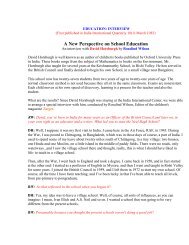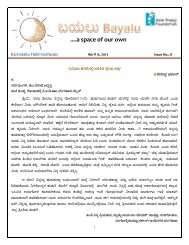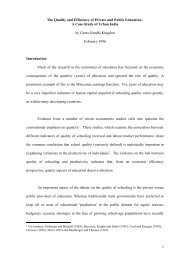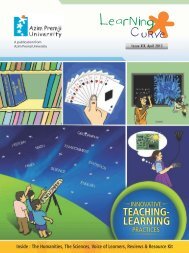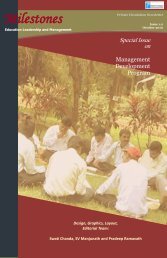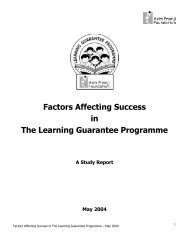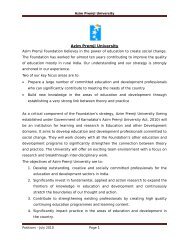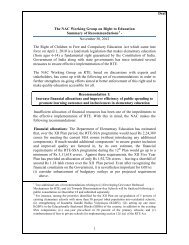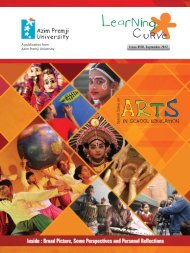Indesign Pagesnew.indd - Azim Premji Foundation
Indesign Pagesnew.indd - Azim Premji Foundation
Indesign Pagesnew.indd - Azim Premji Foundation
You also want an ePaper? Increase the reach of your titles
YUMPU automatically turns print PDFs into web optimized ePapers that Google loves.
It is not easy to discuss questions arising from real<br />
situations in the classroom. Children coming from various<br />
backgrounds and socio-economic strata cannot discuss<br />
such issues academically. The inequity, social domination<br />
and infringement of democracy have names of people and<br />
families associated with it. These are loaded with personal<br />
relationships and involvements. The natural instinct of the<br />
school system would be to avoid confl ict and unpleasantness,<br />
to hide inequities, and plead for peace and harmony. A<br />
good citizen is one who accepts her lot with equanimity and<br />
hopes that better laws would be formed and more effective<br />
implementation would take place. It may be argued that this<br />
is the best choice for a society; but this is in fact just one<br />
perspective. There are counter views.<br />
The Constitution of India promises a just and equitable<br />
society. However, it does not elaborate what kind of citizens<br />
and governance can lead to this. The goal of the elementary<br />
school program therefore has to help the child develop this<br />
understanding. The question therefore is, do we prepare<br />
children to succeed the best in the present situation? Or do<br />
we prepare them to question the dynamics and struggle for<br />
the goals that were promised?<br />
There is therefore a struggle between a program that focuses<br />
on building a spirit of justice and equity in children; and a<br />
program that is focused on peace and harmony, leaving the<br />
tranquillity of the ancient pond undisturbed.<br />
The child comes to the school with many experiences and<br />
interactions with her environment. She has memories of being<br />
respected and valued, of being considered part of a group.<br />
She also has memories of exclusion, memories of dominating<br />
or being dominated, etc. These experiences have structured<br />
her behaviour and beliefs. Based on these, and her own<br />
silent analysis, she has formed her identity. It is not easy to<br />
develop a program which can use these experiences and the<br />
identity in a meaningful manner and develop through them<br />
a common view. Also, it is arguable whether a common view<br />
or a widespread belief system is even desirable. We need to<br />
keep in mind that there are many confl icting world views,<br />
and it is not obvious which world view should be advocated.<br />
We cannot also ignore the fact that the State is controlled<br />
by many dominant forces that would also like to shape the<br />
child’s perspective. The struggle for determining content and<br />
its transaction is therefore intense here.<br />
It is thus obvious that there can be many perspectives<br />
Section A<br />
Vexing Questions in Social Studies<br />
with which to develop social identity and to interpret<br />
environment, culture and history. The perspective chosen is<br />
governed by the presumed relationship of a human being to<br />
society, relationships among humans, and an understanding<br />
of how children learn. Any list of do’s and don’ts, bereft of<br />
choice, discretion and rational analysis, is not acceptable.<br />
One of the things, therefore, to be kept in mind while<br />
thinking about social studies in primary schools is to avoid<br />
failing into trap of developing a didactic program.<br />
E. NATURE OF THE DISCIPLINE<br />
Is it Social Studies or is it Social Science?<br />
The prevalent impression that the scientifi c process offered<br />
a superior way to knowledge and life; that along with<br />
mathematical logic, it formed a complete package to make<br />
the human being rational. These led to a rechristening even<br />
the social disciplines with a scientifi c suffi x .<br />
The power of science and technology globally, and the belief<br />
in the infallibility of evidence-based arguments and rational<br />
logic was considered to be the basis of all knowledge<br />
creation. This idea embedded itself in all areas of studies,<br />
and has led to a value in being scientifi c. The members of<br />
different disciplines in social studies took pains to describe<br />
how their discipline was close to Science, and as cognitively<br />
logical.<br />
Also, it is arguable whether a common<br />
view or a widespread belief system is even<br />
desirable. We need to keep in mind that<br />
there are many confl icting world views, and<br />
it is not obvious which world view should<br />
be advocated.<br />
However, while there is nothing wrong in the need for<br />
arguments and formulations to be logical, it is important<br />
to recognise that many aspects of human behaviour do<br />
not conform to straightforward, rational analysis and logic<br />
because there are too many inconsistencies. The question of<br />
how belief systems, for example, arise is extremely critical<br />
and has to be investigated in a manner that cannot be called<br />
Pg No: 31



